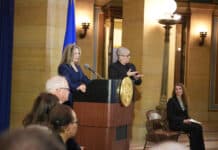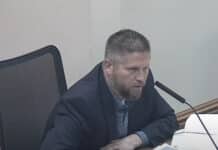We’re hearing a lot about choice in this midterm election season. It’s a persistent drumbeat as DFL candidates hammer one nail, since it’s the only one they’ve got. In ad after nauseating ad, they falsely insist Republican candidates are hellbent on eliminating a woman’s right to choose.
Meanwhile, parents of kids who’ve been born are focused on what’s happening in our schools. As we learn more about how students have fared the past couple of years, another group is beating a different drum, this one for school choice.
Change often begins with the language and that’s true with schools. Offering a fresh perspective, Corey DeAngelis, a nationally recognized school choice advocate, suggests we call public schools government schools. It’s fitting, he says, because the government dictates everything about the school system that is educating most children. The government assigns students to schools based on where they live. The government hires personnel. The government sets schedules and decides what students will learn.
As more families take a critical look at government school performance, they’re voting with their feet. Though they continue to pay taxes to support government schools, they’re enrolling in private and parochial schools, shifting to homeschooling and starting micro schools.
There’s a movement taking place across the nation that’s being embraced by some and resisted by others. It shifts ownership of education directly to families. Education savings accounts and voucher programs are gaining traction, though not with teachers unions or candidates they support.
Most recently, Arizona joined other states that have created or expanded school choice options through legislation. Instead of dollars following schools, dollars will follow students.
It’s worth watching Arizona as it sorts through the details of the new approach. If Minnesota were to follow Arizona’s lead, options currently financially prohibitive for lower-income students (who often attend the worst performing schools) could become a reality.
In November, Minnesota voters will have two distinctly different choices in the candidates for governor. Both say they’re committed to improving academic outcomes. Their allies say a lot about their priorities and approaches.
On the one hand, we have Gov. Tim Walz, a former social studies teacher who has the backing of the nearly 90,000-member state teachers union. He and Lt. Gov. Peggy Flanagan are committed to “fully funding” education, though they won’t define the term.
On the other hand, we have Dr. Scott Jensen, a family physician who’s committed to a parents’ bill of rights. Jensen and running mate Matt Birk have said they’ll put all educational options on the table.
As Minnesota spends nearly $40 billion on education, with diminishing results, concerned parents are becoming advocates. People who have never run for office are doing so because they don’t want their kids to learn about gender ideology. They want their kids to learn about civics, not about resistance. They want student achievement to improve, not decline.
Todd Kruse, Republican candidate for House District 53A, is a school choice parent who sees a broken system and wants to fix it. If elected to the legislature, he’d push for options, transparency, and accountability for how resources are spent. He’s a creative thinker who, among other things, suggests school districts provide families with statements of accounts detailing how much money was spent to educate each child and what outcomes were achieved.
As we learn more about the Feeding Our Future scandal, citizens are demanding transparency and accountability by government agencies, particularly the Department of Education. How taxpayer dollars will be used to educate our kids is the true choice issue on the ballot this November. Be it the governor, school board, or legislature, voters can choose between candidates who want to preserve the status quo and those who want to think outside the box.
The views and opinions expressed in this commentary are those of the author and do not represent an official position of Alpha News.

















